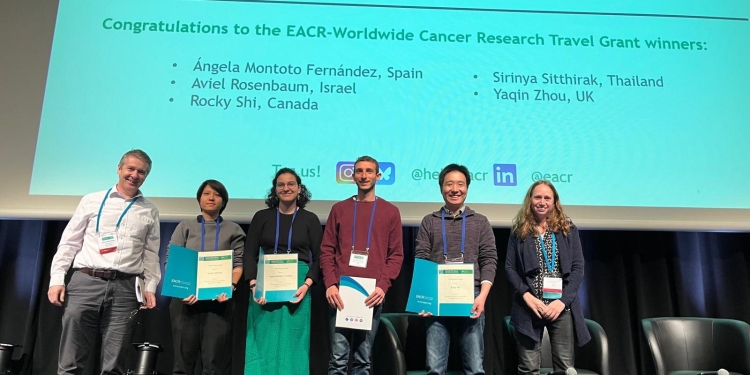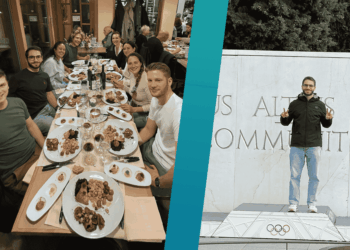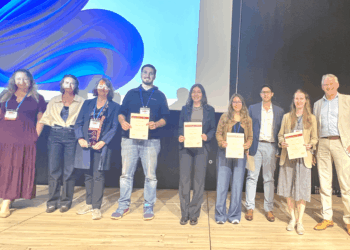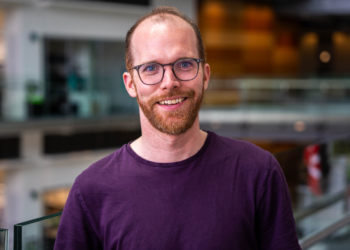We met in Lyon, France for our the EACR Conference: Persister Cells: from Bacteria to Cancer between 18 and 20 March 2025. The event was praised for its diverse scientific programme and networking opportunities, fostering collaboration and community-building in this pivotal rapidly growing area of research.
Supported by Worldwide Cancer Research, we were delighted to award several Travel Grants to help cancer researchers in need of financial assistance to attend the event.
Read on to learn about their experience of the conference.
Ángela Montoto Fernández
PhD student, Hospital del Mar Research Institute, Spain

Research: Some colon cancer patients relapse after completing chemotherapy because certain tumour cells manage to survive the treatment. In our lab, we’ve found that these persistent cells, although originating from adult intestinal tissue, express fetal intestinal genes. We’re investigating why these cells lose their adult identity and switch on fetal programs, as this “fetal conversion” appears to make them resistant to chemotherapy. Interestingly, we’ve observed this fetal gene expression not only after treatment but also in some patients who haven’t undergone chemotherapy yet. Unraveling the mechanism behind this fetal re-expression could help us prevent cancer relapse.
What was a personal highlight of the conference for you?
Listening to scientists talking about their papers, see them explaining their own research, it was like seeing a famous people. It was a unique and highly motivating experience. Reading a paper is not the same as hearing the author explain their thought process and the challenges they faced.
Were there any social or networking highlights you want to tell us about?
As a solo traveler, I made an effort to join many conversations and scientific discussions during the poster sessions and breaks to avoid being by myself. Sometimes, when you go to a conference with people from your lab group, you tend to stick with them and don’t engage in as much networking.
How was this conference different from others you have attended?
I thought the poster session at this conference was really interactive and interesting. At other conferences, there are usually so many people and so many posters that barely anyone stops to read yours or ask questions. But this time, a lot of people came by to ask me about mine, and I also went around asking questions about quite a few others.
Swipe left or click ‘Next’ at the top to see the next report
Aviel Rosenbaum
PhD student, Weizmann Institute of Science, Israel

Research: With the rising use of immunotherapy as a treatment for cancer, we wanted to understand if there are persisting cancer cells that survive immunotherapy. Persister cells are not resistant cells and can survive treatment without genetic changes. They are hard to detect and often thought to emerge randomly, but our research shows otherwise. We demonstrate that cells have a stable, inherited trait—Chance to Persist (CTP)—that determines their likelihood of surviving treatment, using melanoma cell clones. By comparing high- and low-CTP cells, we identified a link to the mTOR pathway. Our goal is to uncover the mechanisms maintaining this state and find ways to reduce CTP, preventing persister cells from escaping immunotherapy and cancer recurrence.
What was a personal highlight of the conference for you?
For me, the most meaningful part of the conference was to get to know the research community studying persister cells. It was inspiring to see that we all face the same challenges, defining persister cells, finding the mechanisms that enable their survival, and making our research clinically relevant. Meeting all these people and realising that we all have the same concerns about our study was empowering.
How was this conference different from others you have attended?
This conference was very well organised in terms of its structure. The number of participants was optimal, including a diverse group of people while still being small enough to create an intimate and friendly atmosphere. This balance made it easy to connect with others, share ideas, and feel part of a close-knit scientific community.
Did you take part in any interesting local activities in your free time outside of the conference?
Yes, I had the chance to explore Lyon and visit France for the first time. I learned about the city’s history and enjoyed the European atmosphere at the beginning of spring. Walking through the streets, experiencing the local culture, and seeing the beautiful architecture made the trip even more special.
How has the conference inspired you in your research?
I really enjoyed seeing that many researchers in the field use similar methods. It made me feel confident that the approaches I use are relevant and that the questions I am tackling are important. Realising that we all face similar challenges created a sense of connection and strengthened my motivation to continue my research.
Swipe left or click ‘Next’ at the top to see the next report
Rocky Shi
PhD student, BC Cancer Research Institute, Canada

Research: My research focuses on understanding how lung cancer cells become drug resistant and finding new ways to counter their progression towards drug resistance. I am particularly interested in the protein, integrin-linked kinase (ILK), and its role in shielding lung cancer cells from our current therapies. We found that not only does ILK promote survival during drug treatment of lung cancer cells, but ILK may also transform these cancer cells into a more aggressive state. Our findings supports therapeutically targeting ILK, which may translate to improved outcomes in lung cancer patients in the future.
What was a personal highlight of the conference for you?
The highlight of the conference for me was the panel of excellent speakers. Each speaker presented their latest update to their ongoing research on persister cells. I was able to learn a lot from each speaker and get for new ideas for my own research. The invited speakers were also very approachable for further discussions during the breaks between sessions.
How was this conference different from others you have attended?
This conference was smaller and more focused than the other conferences that I have attended (e.g. EACR Congress). By being a little smaller, there are no concurrent sessions, which allowed me attend every lecture of the conference. With the topic of the conference being more focused, I found every talk was relatable to my own research.
How has the conference inspired you in your research?
I have found inspiration from many parts of the conference. Each lecture imparted new ideas for me to explore and having the opportunity to talk to the invited speakers raised new scientific questions that I had not thought about before. At the poster sessions, many attendees came by my poster and directly provided new experiment ideas that will improve the quality of my own research.
When you got home, is there anything from the conference that you immediately wanted to tell your colleagues about?
I was very impressed by a spotlight poster that presented on the real-time detection of ERK kinase activity dynamics in lung cancer cells. As my colleagues also work on ERK, I immediately wanted to tell them about the FRET-based ERK biosensor as a tool for their own research. I also immediately wanted to discuss with them about how ERK activity has an oscillating pattern and how this understanding of ERK activity may help explain some of our own findings.
Swipe left or click ‘Next’ at the top to see the next report
Sirinya Sitthirak
PhD student, Cholangiocarcinoma Research Institute Faculty of Medicine, Khon Kaen University, Thailand

Research: My research focuses on understanding intratumoral heterogeneity in cholangiocarcinoma (bile duct cancer) using proteomics and multi-omics approaches. By analysing tumour tissues from different regions of the same tumour, I aim to uncover regional differences in protein expression that could affect treatment responses. The goal is to identify molecular features linked to tumour progression or therapy resistance, ultimately contributing to more precise and effective treatments for this aggressive cancer.
How has the conference inspired you in your research?
The conference has been a great source of inspiration for me in many ways. Listening to leading researchers speak so passionately about their work reminded me of the bigger purpose behind what we do. I was especially inspired by how some speakers approached complex problems with such creativity and persistence. Meeting other young researchers who are also deeply committed to their work gave me a sense of community and motivation. It helped me see new possibilities in my own project and encouraged me to keep asking questions, stay curious, and explore beyond the boundaries I had previously set.
When you got home, is there anything from the conference that you immediately wanted to tell your colleagues about?
Yes, absolutely! As soon as I got back, I was excited to share with my colleagues about the high quality of the presentations and how approachable and supportive the scientific community at the conference was. I also told them about some interesting techniques and ideas I came across, especially related to cancer metabolism and tumour heterogeneity, which are closely related to my own research. It made me feel more motivated and confident, and I wanted my labmates to feel that same energy and possibility for new ideas and collaborations.
Have you brought back any specific knowledge that has benefited your research?
Yes, I gained several insights from the conference that are directly beneficial to my research. One of the most useful takeaways was learning about how other researchers are integrating multi-omics approaches to better understand tumour complexity and treatment resistance. I also learned about new bioinformatics tools that could help me interpret proteomics data more effectively. These ideas have already helped me think about refining my data analysis pipeline and exploring new angles in my study of cholangiocarcinoma. I’m excited to apply what I’ve learned and see how it enhances the impact of my work.
Is there anything else you’d like to mention?
I just want to say how grateful I am for the opportunity to attend this EACR conference. It was not only scientifically enriching, but also personally meaningful. As a PhD student from Thailand, being able to join an international scientific community and feel so welcomed was incredibly encouraging. It reminded me that science truly has no borders, and that collaboration and shared passion can connect researchers from all over the world. Thank you again to EACR and all the organisers for making this experience possible.
Swipe left or click ‘Next’ at the top to see the next report
Yaqin Zhou
PhD student, Queen’s University Belfast, UK

Research: In colorectal cancer, some tumour cells can evade chemotherapy by entering a reversible drug-tolerant state, allowing them to survive treatment with 5-fluorouracil (5-FU). Our research shows that this persistence is driven by significant epigenetic changes, particularly involving histone modifications. Using CRISPR screening and chromatin profiling, we identified histone deacetylase (HDAC) complexes as key regulators of this process. Importantly, we found that HDAC inhibitors can disrupt this drug-tolerant state, reduce expression of survival genes like FLIP, and enhance the effectiveness of 5-FU. These findings highlight a promising combination strategy to overcome chemoresistance in colorectal cancer.
Were there any social or networking highlights you want to tell us about?
I had several great conversations with researchers from different institutions and exchanged contact information with a few of them. It was refreshing to meet people with similar research interests in a relaxed setting. These informal chats often led to unexpected insights and potential future collaborations.
How was this conference different from others you have attended?
One unique aspect I really enjoyed was the icebreaker activity at the beginning of the conference. It provided a casual space to talk about drug-tolerant persister (DTP) cells with people I hadn’t met before. Everyone was open, welcoming, and genuinely interested in sharing ideas – it made the whole experience more engaging and inclusive.
When you got home, is there anything from the conference that you immediately wanted to tell your colleagues about?
Yes – the food! I was really impressed by the attention to detail in the catering. The meals were not only delicious but also beautifully presented. It might seem like a small thing, but it really enhanced the overall atmosphere and made the event feel thoughtful and well-organised.
Have you brought back any specific knowledge that has benefited your research?
One of the most impactful talks for me was by Yaara Oren on cell memory. She showed how ATAC-seq reveals the dynamic nature of cellular memory—how chromatin accessibility may appear similar at a snapshot in time but diverges significantly over longer recovery periods. This concept gave me new ideas for interpreting persistence in our own data.
[td_smart_list_end]
Interested in EACR Conferences and further Travel Grants?
We organise a variety of excellent cancer research conferences, both in person and virtual, where the latest research topics and interaction for participants are the very highest priorities.
To assist researchers who need financial assistance to attend our in-person conferences, we offer EACR-Worldwide Cancer Research Travel Grants. Recipients also get the opportunity to present their work as an oral or poster presentation. Each Travel Grant includes a free registration and funds to support travel and accommodation costs.
Make sure you add the dates of upcoming EACR Conferences to your diary now. Don’t forget we offer EACR member discounts on all of our registration fees!









